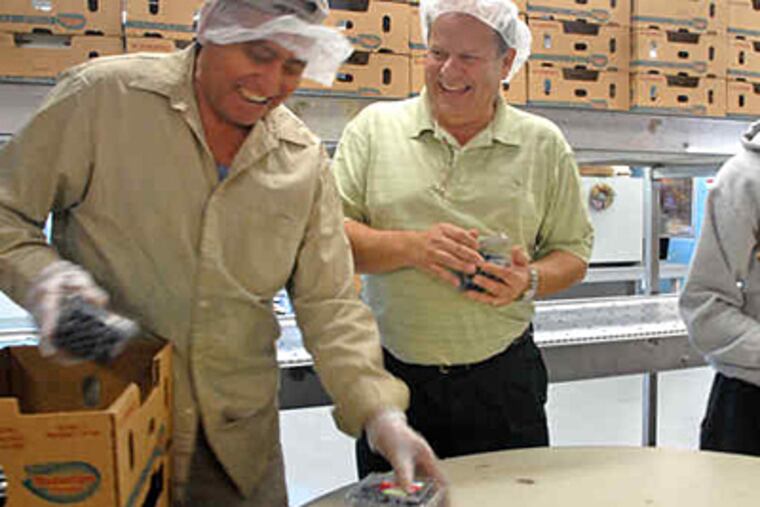Blueberries will help feed New Jersey's poor
HAMMONTON, N.J. - With a deep understanding of tough times - an innate sense that comes easily for farmers who are at the mercy of uncontrollable forces like weather and market volatility for their livelihoods - blueberry farmers Art Galletta and Denny Doyle were quick to join a plan to feed hundreds of New Jersey's needy.

HAMMONTON, N.J. - With a deep understanding of tough times - an innate sense that comes easily for farmers who are at the mercy of uncontrollable forces like weather and market volatility for their livelihoods - blueberry farmers Art Galletta and Denny Doyle were quick to join a plan to feed hundreds of New Jersey's needy.
Galletta and his family own what growers tout as one of the world's largest high-bush blueberry farms. Doyle is considered a farming guru because of his innovations in marketing and product handling. Together they gathered several dozen farmers from throughout Atlantic and Burlington Counties to donate 3,500 pints of blueberries yesterday to Trenton-based Farmers Against Hunger.
"It's the right thing to do," Doyle said. "The thought of children going to bed hungry bothers me very much because children don't really have a say in the choices that are made by adults that lead to them being without the proper food or nutrition."
Doyle is vice chairman of the New Jersey Blueberry Advisory Council. And despite a wet, cool spring that might have provided less than perfect conditions for other produce growers, New Jersey's blueberry farmers have a bumper crop this year. Experts project it will exceed the 53 million pounds of blueberries grown in New Jersey last year.
"When we heard about this program, we were really inspired to want to get involved," Doyle said. "We are putting a nutritionally charged food into the hands of people who might not have been able to afford it or have access to it otherwise."
So fresh from the fields were the sweet, deep blueberries, they still held the warmth of the sun as they were washed, sorted, and carefully placed into pint cartons that were packed into cardboard crates inside the 1,300-acre Atlantic Blueberry Co.
Galletta's family has owned the farm since 1935, and Doyle helps run the sprawling operation in the heart of what is dubbed the "Blueberry Capital of the World." Doyle also owns a smaller blueberry farm in neighboring Burlington County.
"Farmers are usually down-to-earth, salt-of-the-earth kinds of people," Galletta said. "Even in this economy, there wasn't a person that didn't want to get involved when they heard about this project."
By yesterday afternoon, hundreds of pints of blueberries that had been collected at several farms and loaded into the Farmers Against Hunger large panel truck were driven to Mt. Calvary Baptist Church in Camden and the Seventh-day Adventist Church in Browns Mills, where they were distributed.
Today, the truck will stop at church outreach programs at Second Baptist Church in Mount Holly and the Holy Cross Church in Trenton.
It was only a matter of hours between the time the ripe fruit was plucked from the bush to when it would find itself in the hands of someone who is hungry, New Jersey Agriculture Secretary Douglas Fisher said.
"In these very tough economic times, this truly is a significant step to provide fresh, locally grown fruit going to the needy," Fisher said.
Michigan leads the nation in cultivated blueberry production at about 60 million pounds a year, but much of that goes into commercial processing. New Jersey, second behind Michigan in pounds, ranks first in fresh distribution.
New Jersey blueberries are in high season and final tallies are incomplete. If the good weather holds, the Garden State likely will exceed the 53 million pounds of blueberries grown last year on 7,600 acres - crops valued at more than $82 million, according to the U.S. Department of Agriculture.
The popularity of the silvery-sheened berries, which range in color from deep purple-blue to a blue-black variety, is soaring as health experts have begun calling blueberries a "super food," high in disease-fighting antioxidants. About 90 percent of New Jersey's annual crop is harvested in Atlantic County.
And that's good news for farmers like Galletta and Doyle, who have been getting up early with the sun and doing the backbreaking work of planting, cultivating, and harvesting the berries since they were boys, much shorter than the 6-foot-tall, high-bush plants that cover acres and acres of their families' farms.
Ten years ago, New Jersey's blueberry industry began to see prices drop and high demand diminish as other states - North Carolina, Georgia, and Oregon, for example - jumped on the high-bush blueberry bandwagon. Maine and eastern Canada are famous for growing the low-bush variety, used primarily in food processing.
But Doyle and Galletta were among those leading a charge to save New Jersey's industry. They tapped Rutgers University to help them find ways to market their brand and increase profitability.
A decade later, Jersey-fresh blueberries are now showing up in everything, from a "Jersey Blues" iced tea distributed in prime New York City health-food stores to the widely marketed POM Wonderful energy drinks that pair the blue fruit with pomegranates.
Most people, however, still like to simply snack on blueberries, sprinkle them on top of cereal, or bake them in muffins or pies.
And being able to distribute such healthy and popular food to the needy is gratifying for Farmers Against Hunger, program director Judy Grignon said.
"The dedication of farmers from throughout New Jersey to this program is incredible. Our clients appreciate their produce donations more than I can express," Grignon said, noting that since the program started in 1996, more than 15 million pounds of fresh fruit and vegetables have been donated to New Jersey's needy.